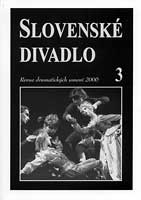Dramatik Viliam Paulíny-Tóth
Dramatist Viliam Paulíny-Tóth
Author(s): Peter ČahojSubject(s): Theatre, Dance, Performing Arts
Published by: Ústav divadelnej a filmovej vedy SAV
Summary/Abstract: A young Slovak theatrologist puts his mind into the area of so far little explored heritage of the Slovak dramatic literature of 19th century. In connection to an important sociable movement that occurred in Europe in 1848/49, and whose component was also a national–emancipation fight of the Slovak intellectuals, that had culminated into a national-liberational revolution, many personalities involved in the fight for the Slovak national rights, devoted themselves also to writing theatre plays and organization of theatre performances, or to performing in plays, because through the dramatic art - being a comprehensible and mass accessible art - it was possible to address also to the then indifferent layers of the population, and wake their interest in the position of the Slovak in the newly formed Europe. A dramatist Viliam Paulíny-Tóth (1826 – 1877) belongs to those dramatists of the romanticism period, about whom the theatrological literature remains silent, or are mentioned just marginally. Out of his drama art it is predominantly Human Comedy, which has been perceived more in the context with Goethe´s Faust. Although there is a direct continuity only in the part of a foreplay, when Faust is dying. Mephistopheles is looking for new sphere of activity. Another play published in magazine article form was Ball Kocsurkovsky. Again, only a brief remark exists relating to the fact that the author of this comedy is Paulíny-Tóth. The same applies to the comedy Pan Slav. Pan Slav Lysický is worthy of remark not only due to the fact that Lysický used to be one of the author´s assumed names. It brings an entirely different picture of a romantic hero, when compared with the images produced in other Slovak romantic dramatic art. Completely outside the theatrologists´ attention was found the tragedy Matúš. While Human Comedy connects the historical aspect with temporary and dummy ones, and they both are penetrated by allegorical aspects, Matúš is a tragedy aiming at being consistently dived into history, and trying to provide its true reflection. History and the character of Matúš ČÁK were to inspire towards bravery and heroism also the Slovak nation. The tragedy is created out of fragments linked alongside, often lacking casual and time consequence. Fragments create segments of Matúš ČÁK´ s life and of characters who contributed in shaping, or co-creating of that particular period. Maybe due to the fact the text was preserved only in the form of a manuscript, it had remained outside the attention of theatrologists. Valuable information on the status of the Slovak drama and theatre in the period of romanticism can be found also through the adaptation of Hugo´ s play Pomsta otcova (Father´s Revenge). This piece of art has also been preserved in the form of a manuscript. It is connected to a question of what was its relationship towards Hodo Sitňan, who is included from the opposite side of Pomsta otcova.
Journal: Slovenské divadlo
- Issue Year: 54/2006
- Issue No: 03
- Page Range: 469-493
- Page Count: 25
- Language: Slovak

